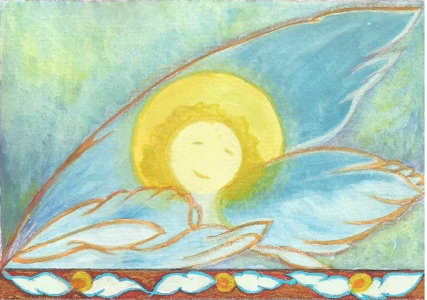Is it fate or sin, what the steward undergoes?
Sin Distances Us from the Whole
In ancient Greek, the verb “αμαρτάνω”- “amartano” (I sin) means that I do not have a share; I am apart from the whole, a non-participant. While the opposite verb “μείρομαι” – “meiromai” means that I have a share. I am part of the whole, a participant in the Whole.
Thus a person with a functioning “steward” in Fourth Way terms is an evolving soul. Such a one is struggling to understand his own involvement in the Whole and walk through his fate. His primary task is the purification of the lower emotional center. It can take many years to be able to express in clear words this process of self-purification.
Maintaining the Duty of the Steward
There is an energy within the lower emotional center that we call the “nine of hearts.” This playing card is a symbol of the steward’s heart or desire to awaken. This part of our mechanism, when purified, maintains the duty of the steward. It is able, consequently, to uphold the sacred connection of our lower energy centers to the higher ones.
In the moments of sacred connection, essence prevails and timidly emerges above personality. This inaugurates one organized mind: body-soul-spirit. Eventually, one’s essential being is in harmony and free from attachments. In Greek, “Εμπάθεια” – “Empatheia”, internal friction, transforms to “Apathy”, non-attachment, internal harmony.
The Steward Must Take the Lead
The hero Odysseus of Greek mythology represents the steward. He is an evolving soul who emerges out of Hades—the second state of sleep. Sequences of divine guidance enlighten him. To turn these into action, he must first convince his companions—the lower energy centers—to follow his direction.
On this journey, like for Odysseus, the steward develops his consciousness while living with his companions. He has to face trials like the seductive energy of the sirens. His being may find it difficult to resist the charm of the sirens’ harmony. Still, the steward makes instinctive, moving, intellectual, and emotional efforts to bring all his companions into necessary balance. To not succumb to the sirens, he must, as their leader, limit some parts of their functions and activate others to the fullest.
After dealing with these immortal enemies on the journey, the steward continues. To hold to the divine guidance he is worthy to receive, he must maintain the right distance from the Island of Helios Hyperion. However, Odysseus succumbs to the hungry plaints of his companions. Disembarking from the ship, his shipmates greedily plunder the immortal energy of a divine domain. This lack of restraint represents how we misuse the fine energy of our higher emotional center.
Recounting the Tale
Finally, separating from his companions, the steward finally reaches safety on the Island of Phaeacus. Here the inhabitants radiate the objective knowledge of their higher intellectual center. The steward, in pure essence humility and sincerity, leaves his passions. He is freed from ‘sin.’ After the journey’s end, he can narrate his story and describes where his passions led him to the conscious inhabitants of this new land. Only after telling his story can he change his level of being. Only after this does he receive new guidance to fulfill his fate in virtue with perfect accuracy.
Natassa Cavalli is an artist living in Greece. For other articles by Natassa, see:
